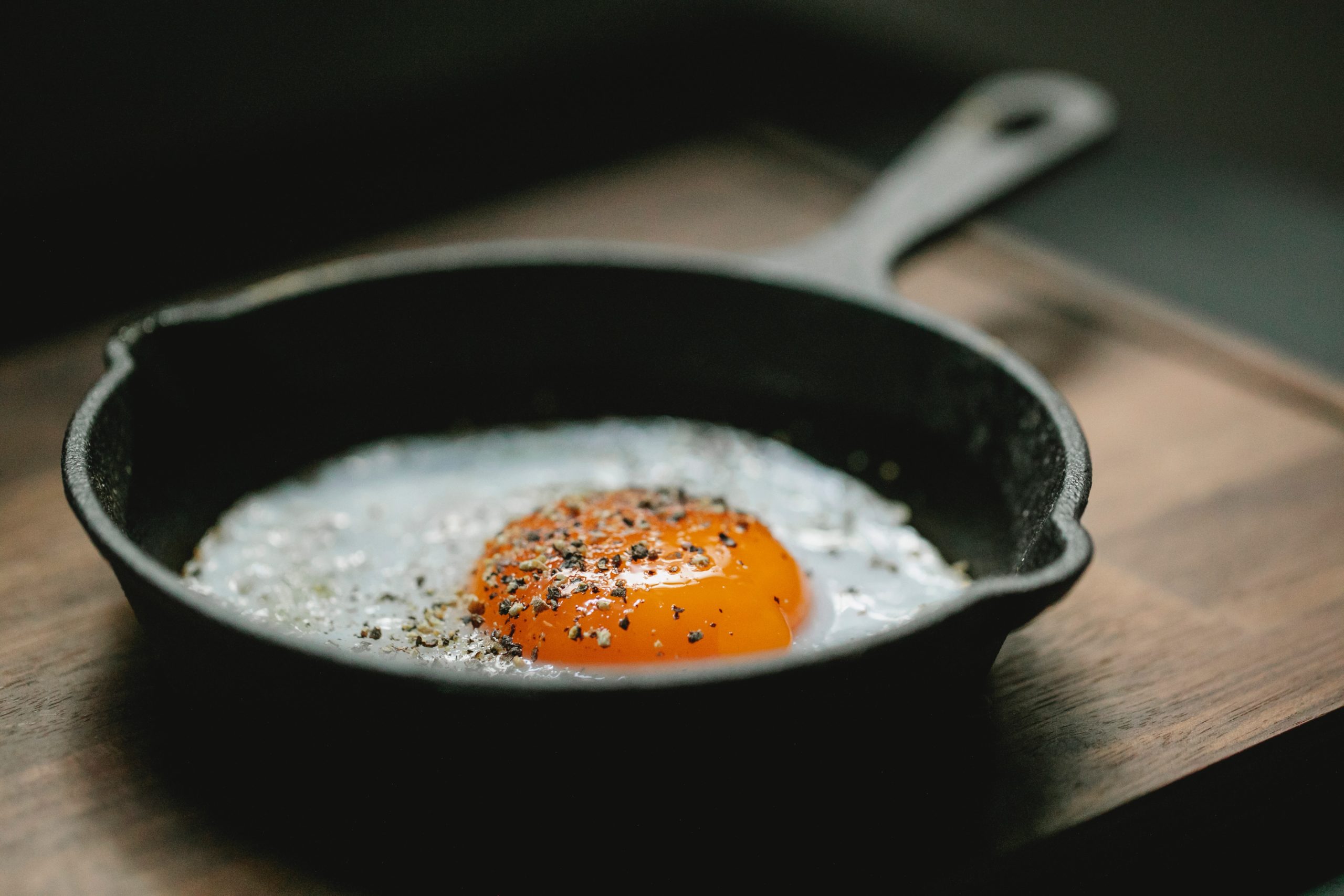12 Mins Read
Vegan eggs come in a variety of guises and are carefully crafted to replicate not only the savoury standalone taste but also the unbeatable binding qualities of animal-laid versions. Do they live up to what they promise? Do they taste good and are they healthy? And what exactly are vegan eggs, anyway?
Vegan eggs have to be one of the more surprising and unexpected additions to the plant-based ingredients roster, especially when you consider that functional alternatives to poultry eggs have been used for years. Apple sauce and ‘flax eggs’ have long been used as binding agents in baking, alongside tofu being a substitute for scrambled dishes. Now, visually comparable plant-based eggs that taste like their conventional counterparts are stepping up, onto our plates. Why? For a potent mix of health and ethical reasons.
We’ve pulled together everything you need to know about the vegan egg food trend, so you can make an informed decision about which versions to try.
What are vegan eggs?
The digital universe is most likely awash with memes about vegans laying their own eggs for breakfast. In reality, vegan eggs are an amalgamation of ingredients designed to mimic either the look and taste, binding abilities, or both, of poultry eggs. Modern substitutes make use of everything from soy milk to mung beans and black salt.
Prepared vegan eggs are the simplest option, or if you prefer not to cook at all, restaurants have started serving up their creations as well. Recipes for homemade options tend to focus on fried egg as they allow for creating distinct white and yellow elements, often using tofu and blendable orange vegetables. Squash is a common choice. Commercially available vegan eggs are most commonly sold as liquids, which can be easily scrambled, turned into omelettes or added to baked goods. Ingredients vary across brands, but many seem to favour black salt (kala namak) in order to get an ‘eggy’ taste and smell.
Aside from liquid egg, folded omelette patties, pre-scrambled and even realistic boiled eggs are all available, with a vegan twist.
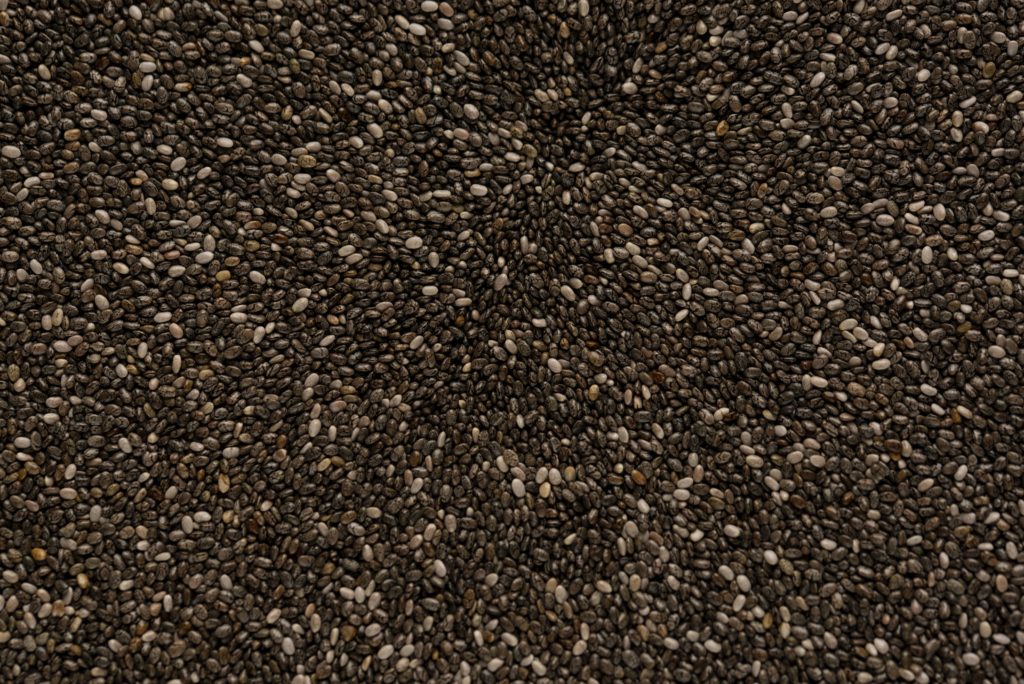
What about homemade versions?
For years vegans have been substituting eggs, whether for baking or hearty breakfast burritos. this means that there is an excellent selection of tried and tested recipes ready to experiment with. For baking, the following have proven effective in the place of one egg:
Apple sauce
1.4 cup of apple sauce cab replace an egg but be aware of added sugar. In sweet baking, this won’t be too much of a problem, but in savoury dishes, you might be better with something else.
Flax
A simple mix of three tablespoons of warm water with one of ground flaxseed. The mix should be prepared first, to be allowed to sit and properly amalgamate.
Chia
Made with one tablespoon of chia seeds and two and a half tablespoons of warm water. This will need a minimum of five minutes, at room temperature, to thicken.
Aquafaba
Made from chickpea water, aquafaba has shippable qualities that give a tasteless, fluffy egg white substitute that has been invaluable for baking. Vegan macarons exist because of this magic liquid that can be whisked into soft peaks.
For savoury ‘eggy’ dishes, try the following:
Tofu
A hero ingredient for many vegans, tofu steps up yet again. Use silken, not extra firm, so you can get a texturally similar end result and add turmeric for colour and black salt for taste. As part of an English breakfast, it works very well.
Mung beans
Owing to the popularity of JUST Egg (see below), many home cooks have tried to make their own mung bean-based ingredient. When softened and blended with coconut milk and nutritional yeast, the beans can replicate fluffy scrambled eggs.
Why replace chicken eggs?
Egg production is not only an environmentally impactful industry, it has unshakeable connections to animal cruelty as well. Battery farming leaves thousands of animals crammed into unhealthy and unsanitary conditions, forcing the use of antibiotics to keep the birds laying. There’s a risk of ingesting hormones and dyes, as well as antibiotics, when eating commercially produced chicken eggs. Of course, salmonella is also a serious concern for many people. Eggs need to be carefully stored and prepared to avoid illness.
For every person that cites the fat and cholesterol content of eggs as a reason to avoid them, another will quote the protein levels as motivation to stock up. Eggs are frequently either the next greatest health food or a serious contributor to serious conditions. This in itself has made people wary and confused.
Why have vegan eggs burst onto the scene? Because as curiosity surrounding plant-based eating has increased, so too has the demand for like-for-like substitutions that offer eaters more options. In a poll conducted by The Vegan Society, 98% of non-vegans said they would be keen to try an egg alternative, which means demand will keep rising and more brands will enter the sector.
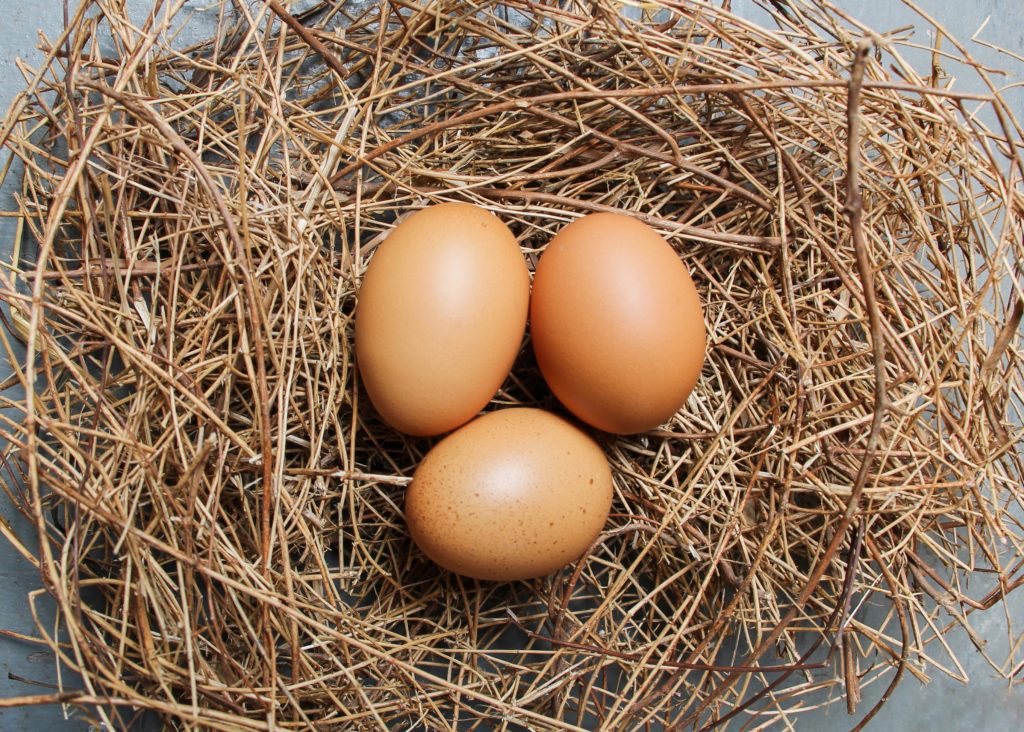
What is the nutrition of chicken eggs like?
Per single medium raw egg, the nutritional profile of a chicken egg looks like this:
- 63 calories
- 164mg of cholesterol
- 4.18g fat
- 5.54 protein
Are vegan eggs healthy?
Depending on the ingredients used, vegan eggs can be healthy. But one indisputable fact is that they are healthier than animal-laid versions, if only because they contain zero cholesterol.
Shown to increase the risk of heart disease, cholesterol can be found in regular eggs, most prolifically in the yolks. Researchers at the Northwestern University in Chicago reported that: “For every half an egg consumed per day, people had a 6 percent higher risk of developing cardiovascular disease, and an 8 percent higher risk of death over 17.5 years.”
Many people eat eggs in order to up their protein intake but remain unaware of the potential health issues that can follow. That being said, the healthiest vegan egg can be turned into a problematic snack when cooked and served in ways that significantly up the fat content. Ingredients are just one factor to remain aware of with preparation also playing an important role.
Are vegan eggs good for the environment?
The sustainability of eggs is an interesting topic, as it brings us directly to factory farming and the emissions, energy use, and waste created by the entire industry. A significant contributor to climate change, factory farming is a common approach to egg production, being both cost and space-effective. However, the cost to the environment is considerable with emissions coming from the production of animal feed, farm energy use, and disposal of animal waste. In short, while the eggs themselves can be classed as a low-carbon animal protein, it’s the production that creates an unsustainable framework.
Comparably, vegan eggs do appear to rely on less impactful methods of production, even when taking into account crop developments (soy is commonly used). This is something that the major players in the market appear to take particular pride in, with many highlighting low water requirements and significantly smaller carbon footprints than animal counterparts.
Our plant-based JUST Egg uses 98 percent less water, emits 93 percent fewer carbon dioxide equivalents and uses 86 percent less land than conventional animal sources.
East Just.
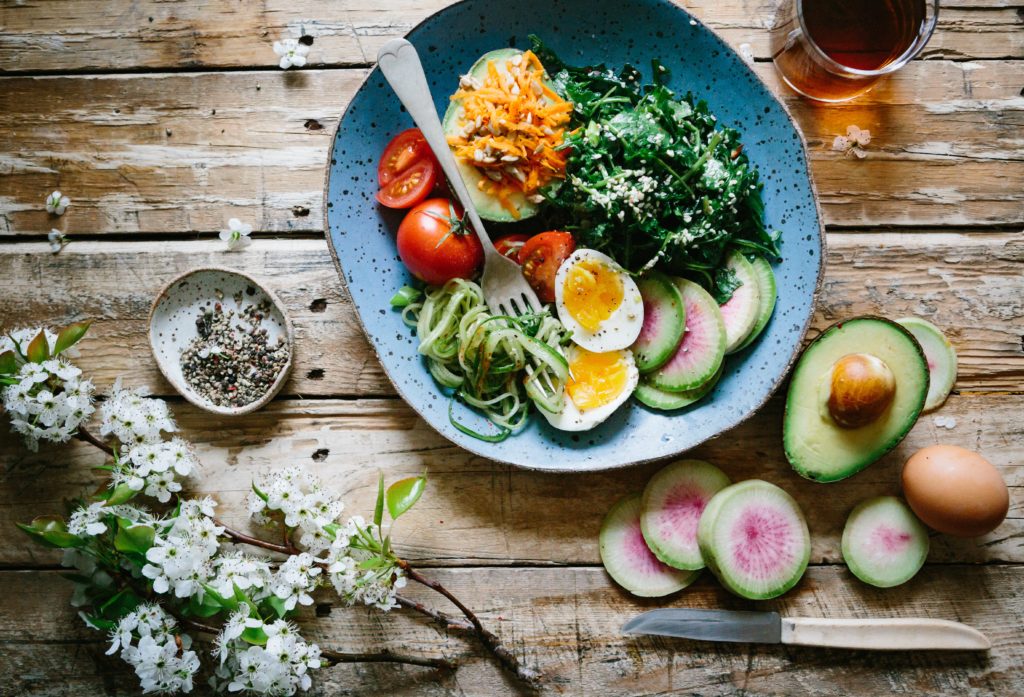
What do vegan eggs taste like?
There’s no point in claiming that they taste identical to conventional eggs, but many come close. Homemade options have the opportunity to get really close, as the differentiation between white and yolk can be more clearly acknowledged. That being said, the most realistic incarnations always make good use of black salt, which deposits a sulphur-like smell and flavour. Nutritional yeast, more commonly used to mimic a cheese note in food, also works surprisingly well and deposits a realistic yellow colour.
More than taste, texture is an important metric here, as all conventional egg dishes have a very specific mouthfeel, which is more what we think a lot of brands have tried to replicate.
What vegan egg brands are there?
As the popularity of realistic vegan substitutes continues to soar, the number of vegan egg brands attempting to crack the market keeps growing. While some have chosen to focus on creating a baking ingredient, others have taken the task of replicating eggs for savoury dishes and as a standalone meal component.
In the U.S. alone, sales within the plant-based egg sector have been identified as growing 168% year on year.
The following is a selection of some of the best around and just for fun, we’ve included the key nutrition information of one serving, to compare with conventional eggs.
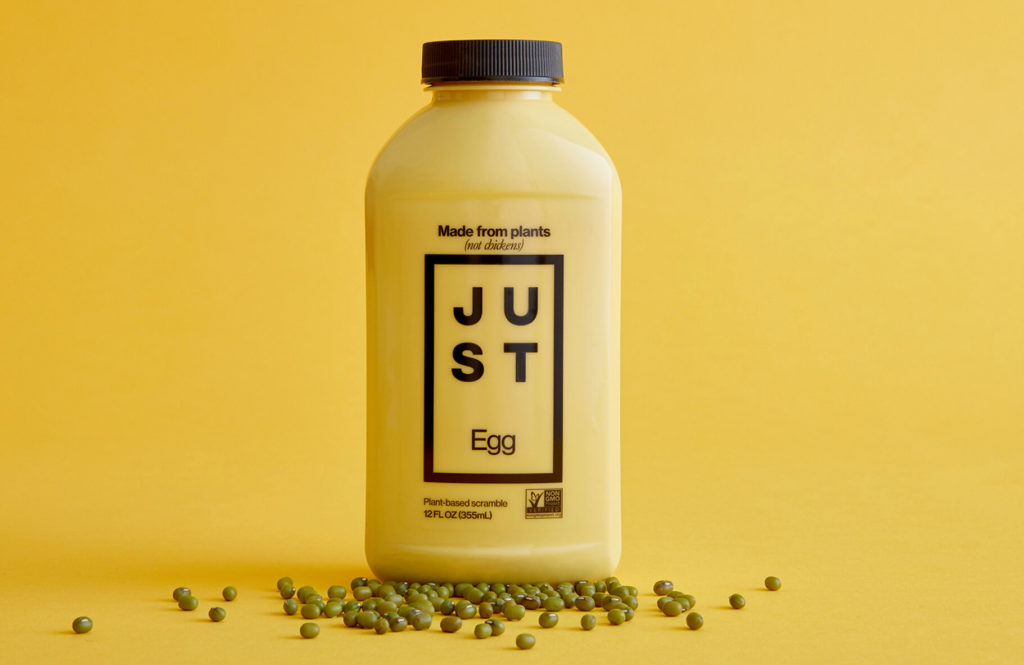
1. Just Egg (Liquid)
Made from mung bean protein, Just Egg can be used as you would use conventional eggs, across a wide variety of applications. We’ve tried it in scrambles, omelettes, puddings, quiches and more and it holds up really well. Of all the egg alternatives, this is our favourite and the most faithful to the original. The company has added Just Egg Folded to its roster, which is a ready from frozen omelette-like that works great in sandwich applications or sliced up in fried rice. Just Egg is available for sale across the US, in many Asian markets and has just been granted EU safety approval, meaning Europe-wide launches are imminent.
Best use: simple scrambled eggs that feel like the original dish and all liquid egg applications.
Nutrition Per 3 tbsp:
- 70 calories
- 0mg of cholesterol
- 5g fat
- 6g protein
Note: Eat Just has just been granted EU safety approval, meaning Europe-wide launches are imminent.
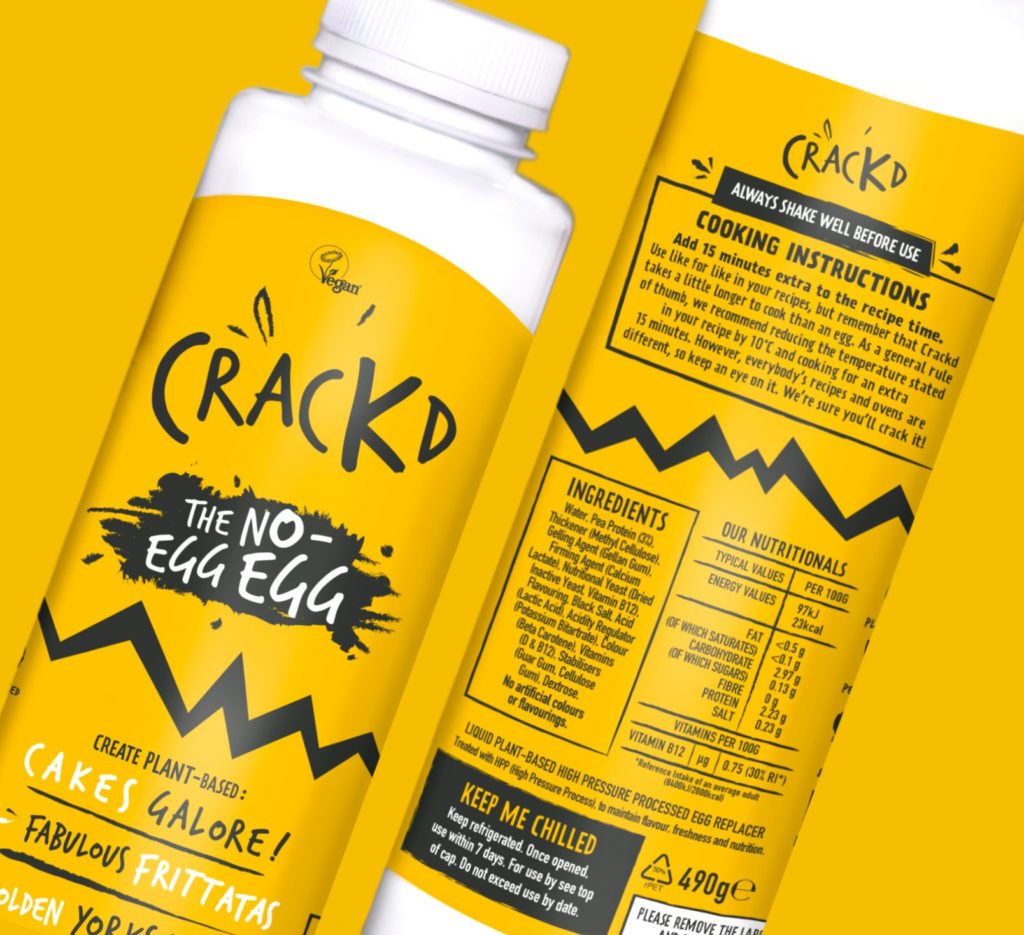
2. Crackd
Made in the UK, Crackd uses pea protein to create a thick but just pourable liquid vegan egg. Interestingly, we found that this is far better suited to being a baking ingredient than a standalone egg dish centrepiece, because it simply takes too long to cook. Finished hot dishes feel a little too globular and don’t always look appealing either. However, in baking, Crackd works wonders, creating bouncy and chewy dishes with no eggy aftertaste.
Best use: brownies and cakes that can be cooked low and slow.
Nutrition Per 100g:
- 23 calories
- 0mg of cholesterol
- 0.5g fat
- 2.23g protein
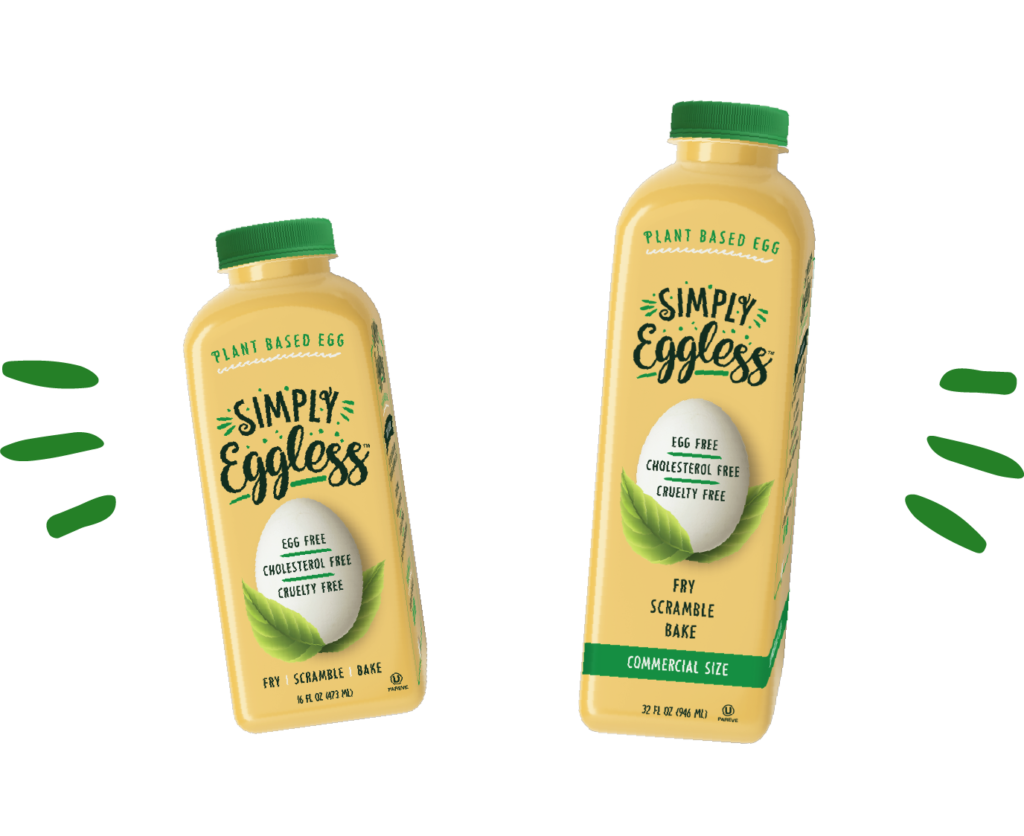
3. Simply Eggless
Bringing lupin beans into the mix, Simply Eggless bolsters its offering with probiotics and a healthy dose of protein too but the really clever touch is the release of two separate products. With a recipe for baking and another for scrambled, Simply Brand Foods has identified what few others have addressed: that one vegan egg seems incapable of working in every application.
Best use: French toast with the baking-specific release.
Nutrition:
- 50 calories
- 0mg of cholesterol
- 3.5g fat
- 3g protein
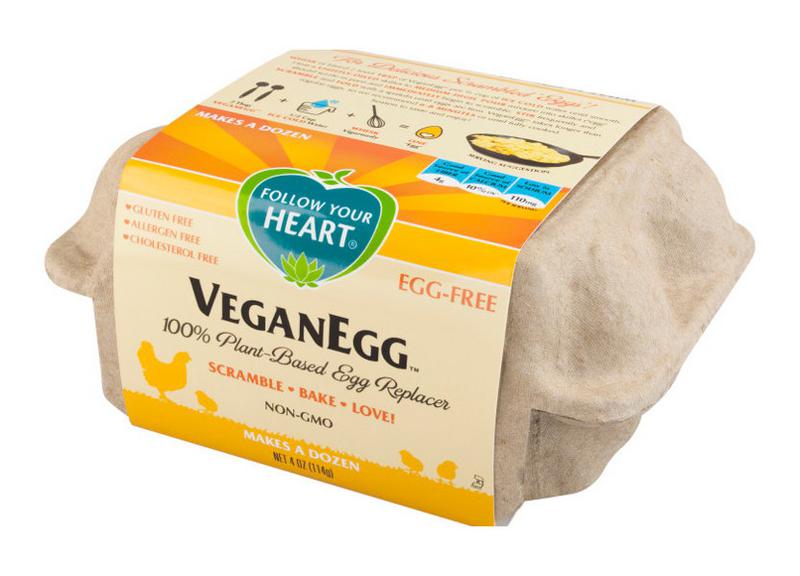
4. VeganEgg by Follow Your Heart
Alongside successful mayo and cheese releases, Follow Your Heart was one of the first companies brought out vegan eggs. A simple and unfussy soy-based recipe, the eggs here can be used in a variety of ways, but despite the (visually appealing) egg box packaging claiming that scrambled is an option, it’s not one we recommend. The finished dish is a little spongy and not hugely flavourful. Still, a useful alternative to have in your pantry for last minute needs.
Best use: sweet baking where a bouncy result is beneficial. Muffins work very well.
Nutrition Per 2 Tbsp:
- 35 calories
- 0mg of cholesterol
- 1g fat
- 3g protein
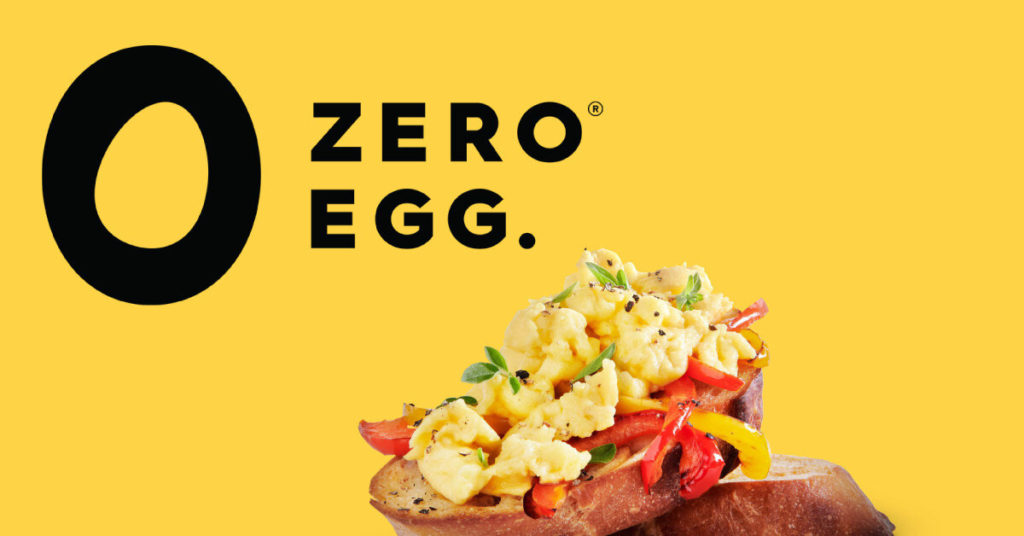
5. Zero Egg
Animal-free protein with a side serving of sustainability, Zero Egg has been designed to taste good, work well and leave a light footprint. Alongside some usual ingredients (soy, pea and chickpea protein) there’s also potato, which adds something special in terms of density. The most varied in terms of products to choose from, there’s a ready-to-use liquid (U.S. only), a sandwich patty and two powders (one for baking and the ‘classic’ for scrambling). Zero Egg offers a genuinely comparable flavour profile to conventional eggs too, making it a great allrounder.
Best use: almost anything as there’s a product designed to work for all recipes.
Nutrition (of 5.3g Egg Basics powder):
- 15 calories
- 0mg of cholesterol
- 0g fat
- 2g protein
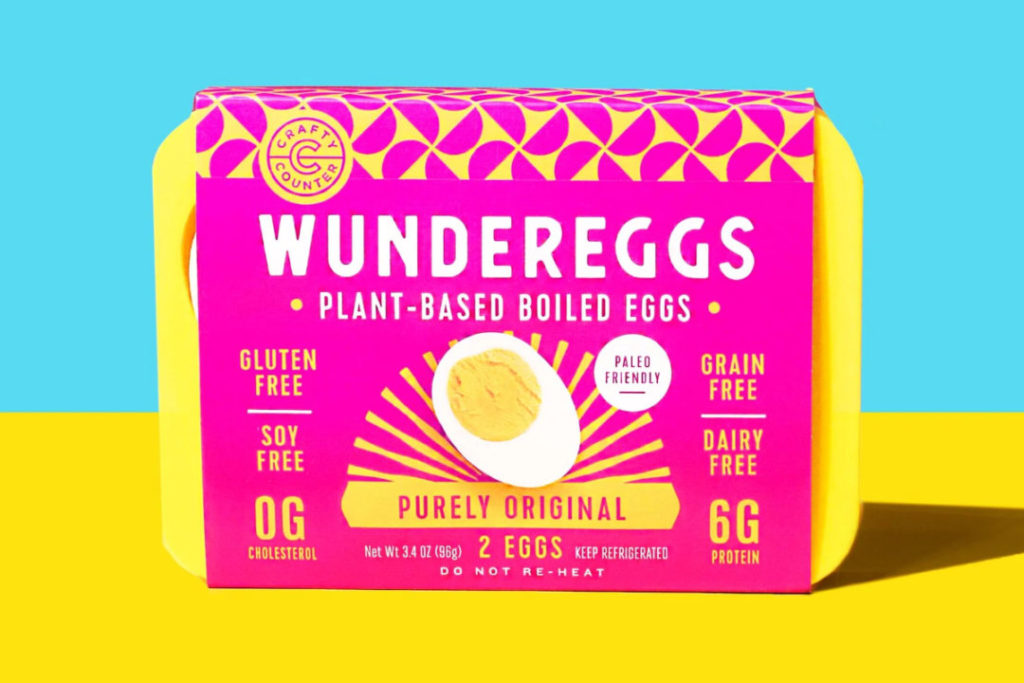
6. WunderEggs by Crafty Counter
Claimed by the founder to be the first 100% vegan boiled egg, WunderEggs by Crafty Counter have the potential to seriously disrupt the egg salad world. Unlike most legume-based plant-based eggs, WunderEgg is made from cashews and coconut milk. Currently available for order on its website.
Best use: Sandwiches, egg salad, devilled eggs- all hard-boiled egg applications work!
Nutrition Per 1 Egg:
- 170 calories
- 0mg of cholesterol
- 9g fat
- 4g protein
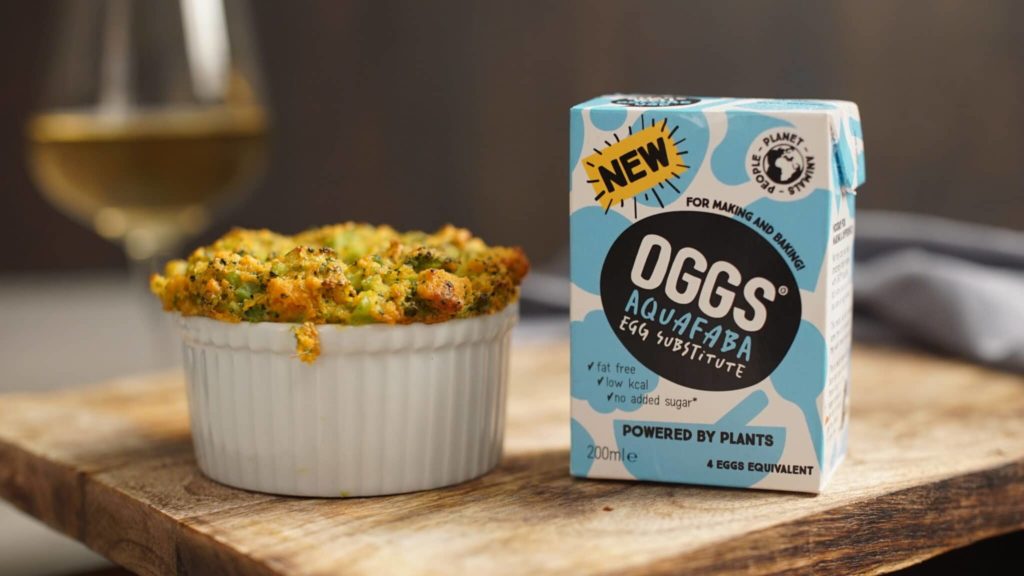
7. Oggs
A handy carton of alternative egg white, Oggs means that you don’t need to drain your chickpeas and remember to save the liquid. It can be used across a range of sweet and savoury dishes, as it has no discernible flavour of its own. Each carton contains four egg’s worth and no, your meringue will not taste like hummus.
Best use: daring baking- you never thought you’d make a vegan macaron but you will with this.
Nutrition Per Serving:
- 9 calories
- 0mg of cholesterol
- <0.1g fat
- 0.7g protein
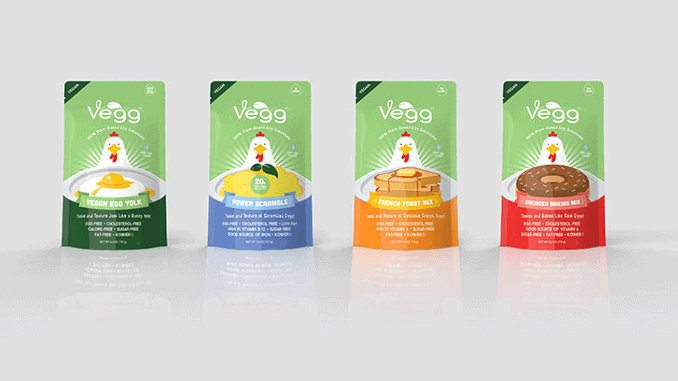
8. Vegg
Currently the only brand on the market with a yolk-only alternative. Different versions of Vegg can be scrambled or used for French toast, but the main product is for dipping. It has a depth of flavour that is momentarily surprising but definitely reminiscent of conventional eggs.
Best use: with soldiers for dipping or in hollandaise sauce.
Nutrition Per Serving:
- 36 calories
- 0mg of cholesterol
- 0.5g fat
- 2g protein
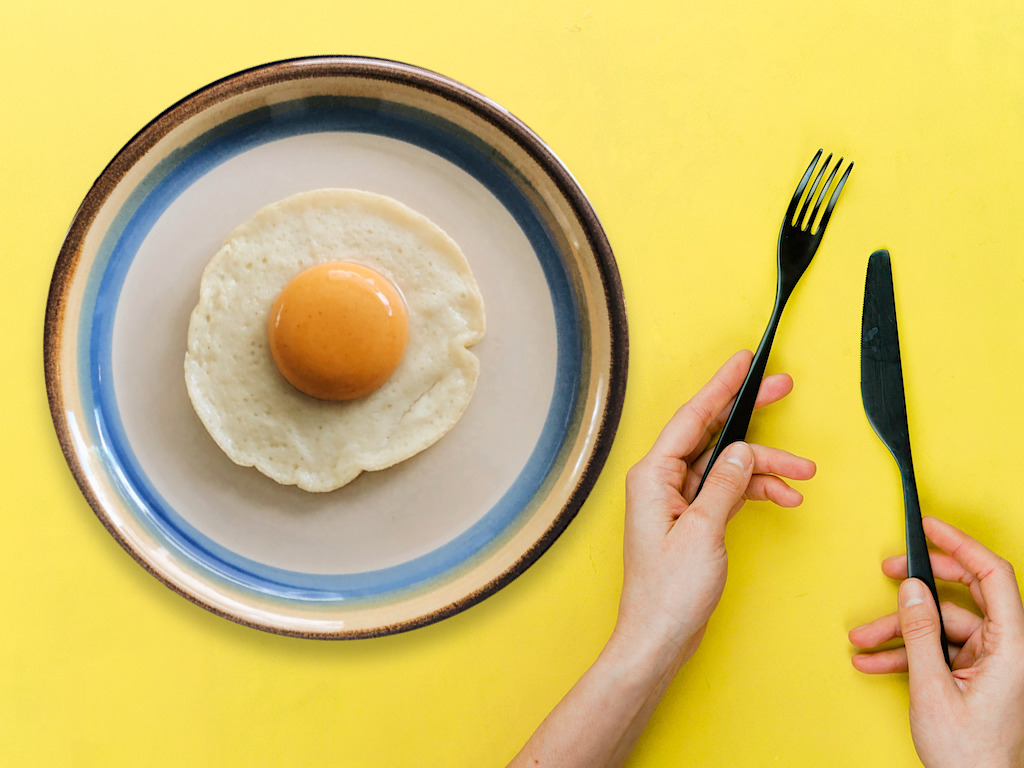
9. OnlyEg
OnlyEg by Float Foods, which is planning an official product launch in 2022, is Singapore’s first whole egg plant-based alternative. The company uses a legume base to create a two-component (the white and the yellow) protein-rich vegan egg that can be cooked just like their animal counterparts.
Best for: seems like it will be ideal for fried eggs and other whole egg recipe applications.
Nutrition Info: Not available.
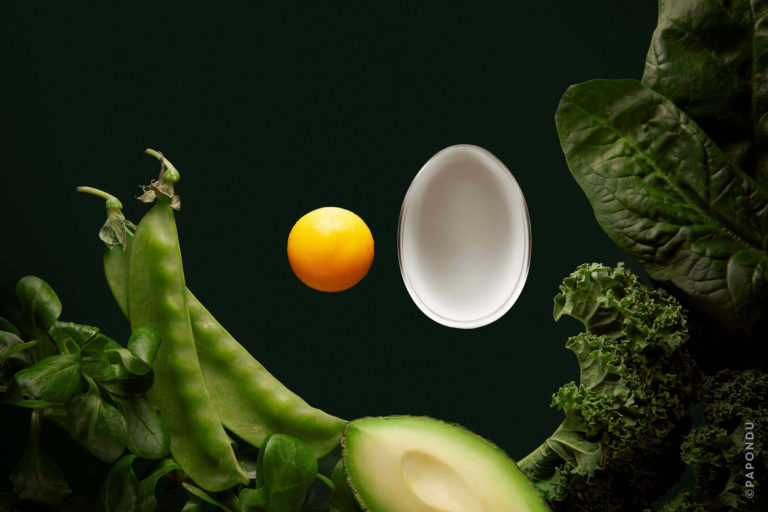
10. Le Papondu (formerly Les Merveilloeufs)
French food-tech Le Papondu has triumphed with a vegan egg that comes in a shell (!) and they promise their product is extremely easy to use. So far the ingredients and flavour are a closely guarded secret and the startup is only serving restaurants right now but a consumer launch is on the cards.
Best for: the company says it can be used in every egg application but it is not available for retail sale.
Nutrition Info: Not available but their website says they have a Nutri-Score by Yuka of A.
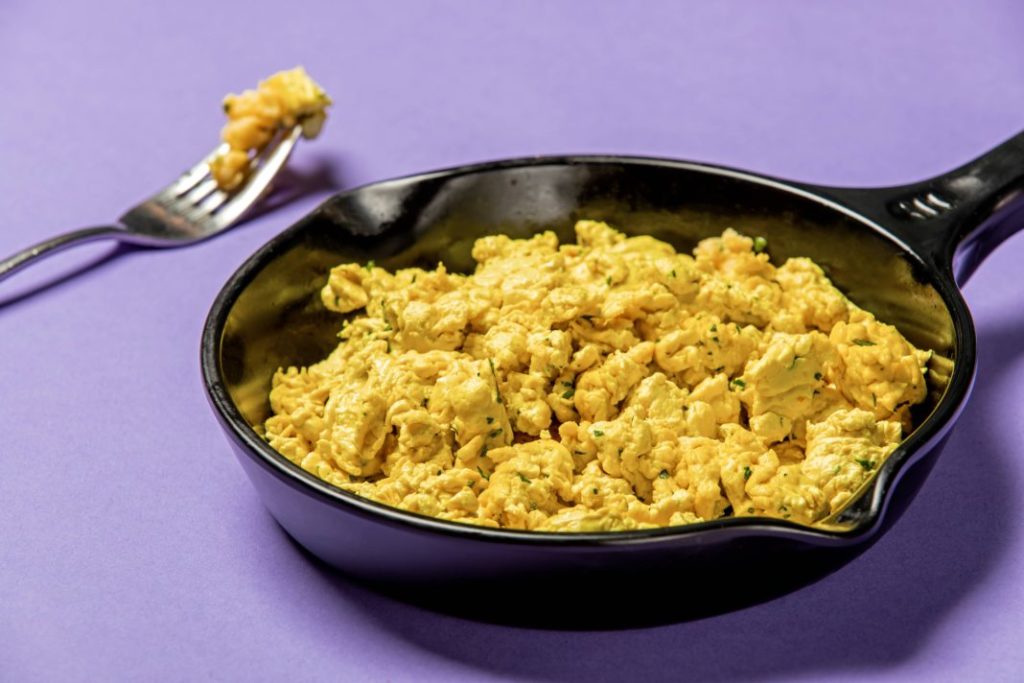
11. Evo Foods
Cited for a 2022 U.S. launch, Mumbai-based EVO originally debuted a mung-bean protein based liquid egg alternative in its home market, and has now added the world’s first shelf stable vegan hard-boiled egg to their range. Neither are available for commercial sale yet but whenever the startup does a tasting, it sells out in mere hours.
Best for: Anda bhurji (spicy Indian scrambled eggs) or any scrambled egg recipe.
Nutrition Info: Not available yet.
Bottom Line? Realistic animal-free foods are proving increasingly popular as meat eaters try new ingredients, either out of sheer curiosity or as a reaction to health and climate concerns. This will drive continued innovation and development, leading to more choice and ultimately, more enjoyment for everyone.
Lead image courtesy of Pexels.

